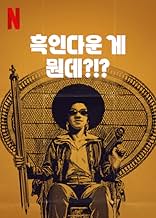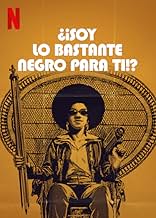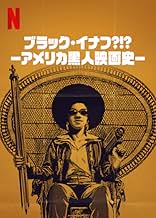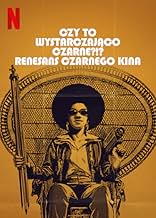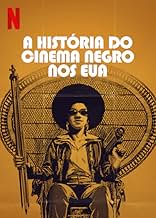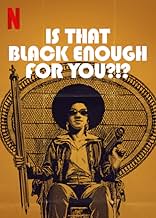Il critico culturale ed esperto di storia Elvis Mitchell racconta l'evoluzione, oltre che la rivoluzione, del cinema nero dagli esordi ai film incisivi degli anni '70.Il critico culturale ed esperto di storia Elvis Mitchell racconta l'evoluzione, oltre che la rivoluzione, del cinema nero dagli esordi ai film incisivi degli anni '70.Il critico culturale ed esperto di storia Elvis Mitchell racconta l'evoluzione, oltre che la rivoluzione, del cinema nero dagli esordi ai film incisivi degli anni '70.
- Premi
- 4 candidature totali
- Narrator
- (voce)
- Self
- (as Louise Archambault Greaves)
- Self
- (as Jim Signorelli)
Recensioni in evidenza
The bad: but after an hour this documentary veers of into all sorts of directions, becoming disjointed and long in the tooth.
It is as if this director simply had no control over his urge to namedrop as many film classics as possible and then start analysing what was wrong with them.
Recommended watch for the first hour, but I fear not many will stay focussed till the very end, because this documentary unfortunately peters out after the first hour.
The documentary mainly focuses on Blaxploitation movies of the 1970s, basically 1968-76, the introductory bit deals with movies before that time. Killer of Sheep and Symbiopsychotaxiplasm get special non-Blaxploitation mentions. I'm not sure I heard Blaxploitation discussed from an afro-american perspective before, certainly not to this extend. Like most people of my generation I learned of these films first from Tarantino. Who as Mitchell points out here got his start by putting dialogues common in black films into the mouth of his white actors. Which, as much as you might dislike that take, is true. And yes you want so say: But, Samuel L. Jackson... and I tell you: he is not in Reservoir Dogs. Now, is he? He is in this documentary though.
Mitchell make quite a number of other interesting point throughout, highlights some of the forgotten pioneers and gives you a good overview of the film of that time. Unless you are easily offended by black view points and you are interested in movies, this is way worth your time. Does it at times makes points I disagree with. Sure, but I am an adult, I don't need people to agree with me 100% to find it interesting what they have to say. And yes sure it could have talked about more or other movies, but it already crammed a lot into it's run time.
Ps. I read in another review here that is very telling that Sidney Poitier wasn't interviewed for this. No, it isn't. Poitier already quite sick by that time, do your f--ing research. Do you really think Poitier was not aware of the things Mitchell says about his career? I'm a white European and I was aware of them beforehand. Also, if you want to know why Roots isn't discussed, because this is about movies not TV.
Basically, the issue here is that the film maker has decided that he wants to cover a LOT of Black films, which forces him to deal with some of them very quickly. One of the seven previous viewers attributes this to a desire on Mitchell's part to show off how many Black films he has seen, but that was not my impression. Rather, it's clear that he is fascinated with a lot of these movies, and intent on sharing his fascination and knowledge with us. That's hard to do in a movie, though, unlike in a book. Mitchell might have thought about doing what Ken Burns has done with some of his documentaries: focus on the most telling things in the movies themselves, and then provide the rest of the information in an accompanying picture book.
Books are good for annotated lists. Movies, not so much.
On the hand, because Mitchell sometimes seems like he is trying to be encyclopedic, some of the seven previous reviewers have criticized him for leaving out X or Y Black film or star. A few have a point, but others didn't pay attention. One complained that Mitchell left out James Brown, for example, which is not true. There is a very striking scene of Brown standing shirtless in a doorway, in all the glory of his virile, muscular, and very angry masculinity. It would have been nice to learn if he was offered roles other than those, but that would have taken more time than Mitchell had in this movie.
The same is true of some of the other previous criticism. Those viewers just didn't watch closely enough.
My take on this is that it was interesting for what it offered, but that it often left me wishing for more than just a tidbit on a given interesting movie. So, I guess, I would have preferred less encyclopedic coverage and more in-depth analysis of fewer movies.
On the other hand, I don't regret having seen any of what I saw.
Mitchell clearly knows this material. He should definitely treat us to an accompanying illustrated book, where he is not limited by time.
One of the more unexpected aspects is it's inclusion of experimental films, from animation to split screen. There is minimal focus on this but it does highlight ambitious storytelling and filmmakers responses to a restrictive system.
Lo sapevi?
- BlooperWhile discussing Le ali della libertà (1994), the narrator identifies Rita Hayworth as white. Hayworth's real name was Margarita Carmen Cansino, and she was of Romani descent (an Indo-Aryan ethnic group, also known by the term "Gypsies"). She had her name changed, and appearance slightly altered, to aid her career. Prior to that, as Rita Cansino, she had been limited to smaller exotic roles.
On a related note, towards the end of The Shawshank Redemption, Andy has replaced the poster of Rita Hayworth with a poster of Raquel Welch. Welch was born Jo Raquel Tejada, but went by "Raquel Welch" for the sake of her career (to avoid getting trapped into roles available to Latinas). She did not acknowledge her true heritage until she worked on American Family (2002).
- Citazioni
Harry Belafonte: Not one picture that I turned down did I regret not doing. I didn't resent any of them. I'm glad others got an opportunity and went off and did it, but my initial... First and foremost, I'm an artist. I'm an actor. And I came out of a school with Marlon Brando, Walter Matthau, Rod Steiger, Tony Curtis, with a director that gave us no quarter. I'm not gonna do anything other than what I think is worthy of being done. And fortunately for me, I was a runaway success in the world at large because I had a globe so passionately approving of my presence in their midst that nobody could dismiss the fact that that thing on the horizon called Belafonte could really not be fucked with. Because anytime anybody came up and gave me an ultimatum, I said, "Fuck you. I'm going to Paris. I'll probably live there if I like, but I... I have a destination that answers your denial of what I could be."
- ConnessioniFeatures A Fool and His Money (1912)
I più visti
- How long is Is That Black Enough for You?!??Powered by Alexa
Dettagli
- Data di uscita
- Paese di origine
- Sito ufficiale
- Lingua
- Celebre anche come
- هل يكفيكم هذا السواد؟!؟
- Aziende produttrici
- Vedi altri crediti dell’azienda su IMDbPro
- Tempo di esecuzione
- 2h 15min(135 min)
- Colore
- Mix di suoni


